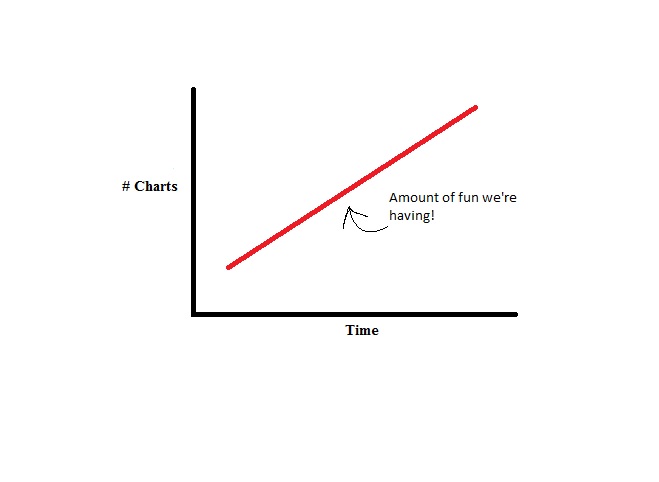
This very scientific chart shows how fun increases with both time and the number of charts we have! AFSC
Like a lot of people, we get worried sometimes about the ways in which news consumption is changing - especially when it comes to our issues. So we were really excited to see some fun new data about how media consumption is changing at a large-scale when it comes to important things like how people find news or, increasingly, how news finds people.
Let's look at some awesome charts from Chartbeat's new study, "How News Consumption Gets Less Diverse Around Major Events."
This study aimed to show what happens to the news people get when they search for it--that is, when they use Google to find news themselves--versus what happens when news finds them--that is, when news items pop up in Facebook and Twitter feeds. Study author Sonya Song decided to look for patterns over a two-month period, and focused on a mix of breaking-news events and regular news cycle events--in this case, the Paris and San Bernadino shootings versus political debates and holiday news.
One thing this study found was that the volume of news coverage went up during breaking-news events compared to other events, at least on Google search and Twitter. No big surprises there. What's surprising is when you look at the volume chart first, and then you look at the second chart right after:
Hello nose-dive! See those dips at the time of the two breaking-news events? That's the diversity in news consumption dropping during times when news consumption (volume) is going up. Yikes! What's up with that?
Here's what we really love about this study: Like all good researchers, Song reminds us to take these findings in context. There are lots of possible reasons for the dip in diversity at crucial times. During a breaking-news event, for example, people are likely more proactive in getting their news (higher volume), and are likely to go to brand-name outlets like the New York Times or CNN for that news (lower diversity). But regardless of why this happens, we'd like to add that this reserach shows the important responsibility that these go-to news outlets still have in our brave new media world: even as search and social change news consumption, these marquee content producers can still shape what kind of narratives get out there, especially at crucial times in U.S. national discouse, like the violence in Paris and San Bernadino.
If we could ask Song only one question, here's what we would ask: does she think the kind of breaking-news event matters? We were struck that the violence in Paris and San Bernadino have a lot of things in common, at least in the ways they were reported--they were both instances of extremist violence, for example. Does the increased volume/decreased diversity pattern hold during a totally different kind of breaking news event, like an earthquake or a plane crash?
In case you couldn't tell, we love data here at Media Uncovered. LOVE. IT. Do you love data? What kinds of data would you love to see more of? Tell us about it in the comments.

